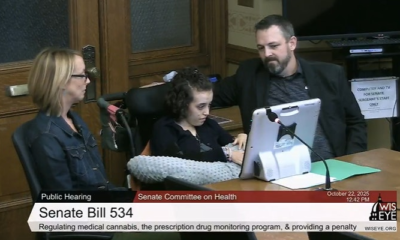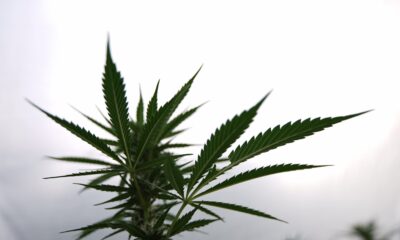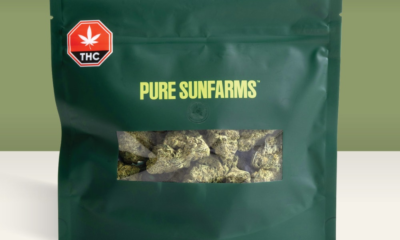Addiction
The Weirdos State of the Union
Published
1 year agoon

Another year being weird is in the books, and what an eventful one it’s been! From THCa to Schedule III, our community is jumping through as many loopholes as ever, and with just as many doomsayers out there waiting to yuck our yum. It can be both exhausting and exhilarating at the same damn time.
As usual though, while the doom & gloom may be great for headlines & clicks, the hearts of the diehards beat on. Our demise is continuously overstated – we’re a resilient kind. We continue to find a way.
Over the past year we’ve covered some major ground in our little experiment over here – from fighting bullshit legislation, to sounding the alarm about spray terps, rebranding the term stoner to praising mylar bags – it’s hard to think of any hot button issues we DIDN’T bitch about. We campaigned for small batch, and macrodosing, while asking important questions like ‘can weed bring us closer to god?’ and ‘who raised you fucking people?’. I called many of us addicts, while Matt called those who don’t smoke cops. (Only teasing, he didn’t say that.) But to say we’ve got range, and depth, at this point I’d say that’s a pretty massive understatement. We’re fuckin’ meta, baby. (The adjective, not the company.) It’s crazy to see the legs this lil’ section has developed, and the voices that are now asking to be a part of it – we’re truly just getting started…
But if you remember last year’s recap, I had promised to evolve this section with some new features & assets that I thought would be coming online and well… they didn’t. Instead, some other things happened, and we’ve had to take a different direction, so let’s start there.
What’s going on with High Times?
Now if you’ve been following the news lately you might’ve seen some stories out there starting to count us out, or preying on our demise. I’ve had a lot of articles shared with me over the past few weeks that contained questionable information about the company and our situation, so I figured this was a good medium to set the record straight. I know every person that dislikes the brand or me personally has shared these articles, and celebrated that we’re likely all out of jobs. Well friends, I hate to break it to you, but the truth, as always, is likely going to be much less satisfying than the idea you’ve made up in your head. You’ve got some valid questions and while I don’t have all the answers right now, I’d like to give a little update for all of you wondering what’s up.
Right now, High Times is in the process of a rebirth. While I can’t speak to or for any other area of the High Times enterprise, I can speak to what’s going on in this particular house. As you all know, our media business is an important cornerstone of this industry. Now in its 50th year of operation, the magazine’s voice has been a rallying cry for our culture longer than most of us have been alive, and it’s one many people, including myself, would like to see given the proper love and care it deserves in order for it to continue to bear fruit for the community for many years to come. Because of that, and many other things that actually have very little to do with us, High Times is currently in the process of changing ownership.
What does this mean?
Similar to the acquisition that happened in 2017, sometime in the next few weeks, or months, High Times will be acquired, and thus have a new owner. We are in a process right now where court appointed representatives are studying what we do & packaging up our business to offer it to potentially interested parties who may want to develop or operate it going forward. This is company-wide, and every asset and business area we have is being analyzed.
Now, our media business has operated independently from the other business areas forever, but it is possible, and honestly likely, that this side of High Times will be separated from some of the other assets our former leadership amassed over the past few years. I know that this may seem like a loss for the brand, but in reality optimizing our lean business model in order to ensure we can grow and prosper for years to come is essential for every business, and it’s the media side’s biggest priority. This is likely a necessary decision for the future of all of our current business areas. Speaking for my team, we all love what we do, and are honored to do it – we simply can not imagine letting this voice fall off into the ether, and we’re doing everything in our power to protect it. While it’s not 100% in our control, I’m feeling pretty good about the future right now, for the first time in a while.
While sure, any change of this magnitude is scary, and uncertain, the truth is that High Times is an incredibly resilient brand. It WANTS to breathe, and grow – it just needs the room to do so. Had you told me 10 years ago High Times would be publishing longer than VICE I probably wouldn’t have believed you, but with all I’ve seen over the past 7 years here it no longer surprises me. I have watched countless people try to hold us down or count us out in my time here, and none have been successful. The brand continually carries on in spite of whatever gets in its way. High Times really is just like the plant we all love so much, it’s a weed – it’ll bloom through whatever cracks of light it gets. And we’re here to prod those little cracks to let some more light in.
Now, while I can’t promise that whoever the new owner is will want to keep me or any of this around, I can tell you my priority is ensuring this team continues on. That the work continues on. What I can promise you, dear reader, is that I will keep doing whatever in my power is best for this business, this brand, this community, and the information that you deserve, no matter what the future brings, or what may happen to my role at this company. I have fought many an executive who thought we could just Chat GPT this work out, and I am not afraid to continue that argument as long as they’ll have me, but we don’t get to control everything… Whatever the case, we’ll find a way forward.
Silver Linings
So with that brief explainer, let’s loop back around to my initial point.
Because of all that’s been going on the past few months, the growth that I expected to see at the end of last year obviously hasn’t happened – respectfully, our priorities have to shift with the business – but rest assured, we haven’t given up! In fact, in true High Times fashion, we turned those lemons to lemonade, and worked out some new, more cost-effective, ways to get these ideas over the finish line. We even worked out a few kinks to spruce the projects up a bit. While we’re still underwater dealing with this sale, and addressing the very real concerns many of you have raised to us, I am confident that the new model we’ve hypothesized will allow us to create a bunch of that content we’ve been waiting to make for you – no matter who is manning the ship at that point. I don’t want to let too much out of the bag yet, but yes, we have heard all your requests for video content and podcasts, and we’re not too far from the day we’ll get to introduce them to you.
I know you’ve got more questions – and that the road ahead seems long, and tired, but the truth is we’re far closer to many of our goals than we’ve ever been, and we’re all fighting harder than ever. With all the momentum we’ve built over our collective history in this fight, let’s not forget to remember how far we’ve come. We’re doing the things our ancestors thought impossible; it would be silly to give up now.

Author: mscannabiz.com
MScannaBIZ for all you Mississippi Cannabis News and Information.
You may like
-


FDA Weighs Petition On ‘Significant Harm’ Of Marijuana Hair Testing Device’s Positive Results From Secondhand Smoke
-


Wisconsin Lawmakers Rally for Medical Cannabis Legalization in Committee Hearing
-


Massachusetts Campaign To Roll Back Marijuana Legalization Law Is ‘On Track’ To Make 2026 Ballot, Spokesperson Says
-


Village Farms Introduces Industry-First, One-Way Aroma Valve in Cannabis Packaging
-


Ohio House Passes Bill To Remove Voter-Approved Marijuana Legalization Protections And Restrict Hemp Market
-


Sorting Robotics Becomes Cannabis Manufacturing’s First True Systems Integrator
Addiction
Yale Researchers To Study Psilocybin for PTSD, Mental Conditions
Published
1 year agoon
May 31, 2024
A pilot program on the benefits of synthetic psilocybin for mental health issues like post-traumatic stress disorder (PTSD) is set to begin this summer at Yale University in New Haven, Connecticut.
A study cohort will consist of 50 patients, mostly veterans and first responders, who are with mental health concerns like depression and addiction. Participants will take 25 mg of synthetic psilocybin, and after the psychedelic effects wind down, they will discuss issues and progress (or lack thereof) with trained therapists.
Connecticut Post reports that the goal is to fulfill the need for state data that has been lacking, according to state Rep. Michelle Cook (D-Torrington).
“We need to have the data to show that there is documented proof of what that therapy does,” Cook said. “We know that it has some incredible outcomes when it is done right, when it’s done by people that are trained in how to use it for treatment of PTSD and so forth.”
Researchers at Yale have been studying the “psychological, neurobiological, and therapeutic effects of psychedelic substances” like psilocybin for decades..
Using a Schedule 1 drug in a clinical setting creates a set of unique problems, including the inability to use insurance. “Even though it’s a research program, you are treating them clinically. And then, in order to treat them clinically, you need to have malpractice coverage,” said Yale researcher Ben Kelmendi. Kelmendi and his team are about to embark on a first-of-its-kind study, a pilot program at Yale.
Research on the medical benefits of psilocybin have been severely hampered due to legal restrictions, Kelmendi said. Only certain qualifying conditions are acceptable in this case. PTSD, for instance, is a complex issue that many people fail to treat.
“With veterans, they will not seek treatment right away,” Kelmendi said. “They will start turning to alcohol or other substances, and so that now they have a comorbidity, and that comorbidity—which really is their own way of coping—will exclude them from the study. They are real patients who are actually suffering and who actually need help. They cannot access these medicines because they do not fit that cookie-cutter profile.”
The impact of PTSD is hard to define as it affects multiple aspects of daily life.
“There is no one scale that actually captures the complexity of one’s daily functional impairment. It’s actually an index of several different scales,” he said. “One is days missed at work, productivity and relationships, just more daily living. I think that is much more important than saying ‘Oh, have your PTSD symptoms improved or not?’”
Participants will take 25 mg of synthetic psilocybin, enough to induce a psychedelic experience, and the therapy is patient-directed. They will be taken in a comfortable space and about six hours later, participants will undergo a psychotherapy session.
“Twenty-five milligrams would be considered a moderate dose. It’s not a heroic dose necessarily, but it’s a psychoactive dose, for sure,” Kelmendi said. “The non-directive supportive psychotherapy is to be done after the dosing rather than during the dosing.”
The Many Potential Health Benefits of Psilocybin
The Yale Program for Psychedelic Science supports this goal with several currently active studies on psilocybin. These include studies on Obsessive Compulsive Disorder (OCD), Major Depressive Disorder (MDD), cluster headaches, post-traumatic headaches, and migraines. Kelmendi is working on several of them.A 2022 report published by a working group under the direction of the Connecticut Department of Mental Health and Addiction Services, was clear about the potential of psilocybin in therapeutic medicine.
Even people who don’t necessarily intend to gain benefits for mental health from psilocybin are still benefitting, a separate study suggests. A study published last September found that using psilocybin outside of a clinical setting was associated with mental health benefits including decreases in anxiety and depression. The research, which was published September in the journal Frontiers in Psychiatry, studied nearly 3,000 people who reported on their experience taking psilocybin mushrooms.
To conduct the study, which is reportedly the largest study of psilocybin in a naturalistic (non-clinical) setting, researchers spent two years collecting data from 2,833 participants who planned to take psilocybin for purposes of “self-exploration.” Most participants were college-educated white men in the United States who had previous experience taking psychedelic drugs.
The study participants were asked to fill out five surveys as part of the research. The first survey was completed two weeks prior to the psilocybin experience, which usually consisted of ingesting dried mushrooms, and again the day before the planned psychedelic trip. The remaining surveys were taken one to three days after the experience, two to four weeks after and two to four months after taking the psilocybin.
After analyzing the data from the surveys, researchers determined that participants reported long-lasting reductions in anxiety, depression, alcohol misuse, neuroticism and burnout. Additionally, the participants reported improvements in cognitive flexibility, emotion regulation, spiritual well-being and extraversion. The new research aims to add to the body of knowledge of what is known about the effects of psilocybin.

Author: mscannabiz.com
MScannaBIZ for all you Mississippi Cannabis News and Information.
In an interview with Taste of Country published on May 24, Grammy Award-nominated country artist Jason “Jelly Roll” DeFord said that he smokes weed to stay away from hard drugs that he’s used in the past—namely opioids and benzodiazepines.
Given his past as an addict and his role in speaking against the use of fentanyl sweeping the country, the interview quickly shifted on the topic of drugs. But Jelly Roll doesn’t see weed the same way as hard drugs which can tear families apart and lead to deadly overdoses.
“I get in trouble for this, all the time, but my stance on marijuana will always be the same: I believe marijuana has helped me in so many regards, with my anxiety,” Jelly Roll told Taste of Country. “This is a hot button topic, but, truly, marijuana has kept me sober.”
The country superstar paused for a moment, then added, “I think a world without weed, Jelly Roll’s drinking codeine and popping Xanax and snorting cocaine again, but a world with weed, I’ll be alright.”
Jelly Roll abandoned hip-hop for a career in country music—which turned out to be a wise and lucrative decision. Jelly Roll’s album Whitsitt Chapel hit number 1 on the Billboard Top Rock Albums chart and number 2 on the Billboard Top Country Albums in 2023. In November 2023, he won the award for New Artist of the Year at the 57th Annual Country Music Association Awards. He’s won three CMT Music Awards and several other accolades.
TMZ reports that Jelly Roll has been a huge voice against fentanyl use and an example for people dealing with drug addiction. Last January, he appeared in front of Congress to back anti-fentanyl legislation called the Fentanyl Eradication and Narcotics Deterrence (FEND) Off Fentanyl Act.
Jelly Roll gave an opening statement at a Senate Banking, Housing, and Urban Affairs Committee hearing about fentanyl awareness and legislative solutions to stop illegal smuggling of fentanyl. “Fentanyl transcends partisanship and ideology…this is a totally different problem,” he started the hearing with in a speech that was described by many as “powerful.”
‘The sad news is that narrative is changing, too, because the statistics say that in all likelihood almost every person in this room has lost a friend, family member of colleague to the disease known as addiction,’ DeFord told the committee chaired by Cleveland Democrat Sherrod Brown. ‘I could sit here and cry for days about the caskets I’ve carried of people I love dearly.’”
Jelly Roll with a powerful testimony in Congress today urging lawmakers to pass legislation to combat the supply and distribution of fentanyl:
“I was a part of the problem. I am here now standing as a man that wants to be a part of the solution” pic.twitter.com/V2GiiKVS0q
— Wu Tang is for the Children (@WUTangKids) January 12, 2024
His messages about fentanyl and hard drug use, and the potential of replacing them with a less dangerous substance such as pot, have made a lasting impact.
Cannabis for Addiction
Cannabis has been explored for its potential role in fighting addiction of hard drugs. Some studies have focused on CBD for treating addiction disorders, some of which are caused by compulsive cravings, while others focused on THC as well.
While many studies have focused on cannabis to curb opioid use with some looking more broadly at stimulants, new research suggests that it could prove useful for those with crack use disorder (CUD). In fact, the popular non-psychoactive CBD, or cannabidiol, seems to be the key element.
The study, published recently in the International Journal of Mental Health and Addiction, utilized a double-blind randomized clinical trial comparing CBD to three drugs commonly used to treat CUD: fluoxetine, valproic acid and clonazepam. Authors represent a number of Brazilian academic and official institutions, comprising various departments at the University of Brasília, the Brazilian Federal District’s secretary of health and forensic institute and the Federal University of São Paulo.
The research ultimately found that participants who took CBD had better health outcomes and fewer adverse effects compared to those who underwent traditional pharmaceutical options.
In another study published in the journal Addictive Behaviors, researchers found that cannabis is not only widely used to manage stimulant cravings but that it may be an effective strategy to reduce stimulant use.
To further analyze how cannabis use may affect people using stimulant drugs, researchers collected data from three cohorts in Vancouver, Canada: the At-Risk Youth Study (ARYS), the Vancouver Injection Drug Users Study (VIDUS) and the AIDS Care Cohort to Evaluate Exposure to Survival Services (ACCESS).
Researchers used a cross-sectional questionnaire alongside logistic regression models to analyze the relationship between cannabis use to manage stimulant cravings as well as self-reported changes in the frequency of stimulant use.
Many others say cannabis replaced their daily alcohol use.
The studies seem to back up some of the claims about cannabis and sobriety. Jelly Roll, like country outlaw Willie Nelson, are helping to spread the good word on cannabis to the country music world.

Author: mscannabiz.com
MScannaBIZ for all you Mississippi Cannabis News and Information.
Addiction
Daily or Near-Daily Cannabis Users Outnumber Alcohol Users of Same Frequency
Published
1 year agoon
May 23, 2024
The rising prominence of regular cannabis use over alcohol use is nothing new.
We’ve witnessed myriad research in recent years showing that states with legal recreational cannabis see decreases in alcohol use, that Gen Z tends to prefer cannabis over alcohol and other reports noting that cannabis has consistently generated more tax revenue than alcohol and cigarettes in states like Colorado and Washington.
So it’s not necessarily a surprise that, for the first time, the number of Americans who use cannabis on a daily, or near-daily, basis has eclipsed those who drink alcohol at the same frequency. Associated Press first reported on the recent analysis of national survey data, finding that an estimated 17.7 million people reported daily or near-daily cannabis use, compared to 14.7 million daily or near-daily American drinkers.
For comparison, 1992 was the low point for daily cannabis use as less than 1 million people at the time said they used cannabis every day.
Daily Use Among 40% of Cannabis Consumers
According to study author Jonathan Caulkins, who researches cannabis policy at Carnegie Mellon University, alcohol is still more widely used, but 2022 was the first time that the level of cannabis use overtook daily or near-daily drinking.
“A good 40% of current cannabis users are using it daily or near daily, a pattern that is more associated with tobacco use than typical alcohol use,” Caulkins said.
Caulkins’ study, titled “Changes in self-reported cannabis use in the United States from 1979 to 2022,” is based on data from the National Survey on Drug Use and Health and published in the journal Addiction on Wednesday. It notes that there was a 15-fold increase in the per capita rate of reporting daily or near-daily cannabis use from 1992 to 2022, whereas the 1992 survey found 10 times as many daily or near-daily alcohol users compared to cannabis users.
Reflecting alcohol as the more commonly used substance, the study notes that the median drinker reported alcohol use on four to five days in the past month, versus 15 to 16 days of past-month use for cannabis users. Past-month cannabis consumers were almost four times as likely to report daily or near-daily use and 7.4 times more likely to report daily use, according to the study.
A Decades-Long Journey for Cannabis
Of course, this trend is no accident. It’s the product of gradual policy changes, advocacy and broader education surrounding the true nature of cannabis use and cannabis consumers following decades of skewed propaganda and harsh criminalization.
The study notes four major periods of cannabis policy fluctuation in the U.S., starting with liberalization in the ‘70s as 11 states decriminalized or reduced cannabis-related penalties. This is alongside the Shafer Commission report, which countered the popular notion that cannabis users were dangerous, concluding that users tend to be more passive and cannabis does not cause widespread danger to society. It also recommended social measures to curb usage rather than criminalization.
The more conservative policies of the 1980s and early ‘90s followed, with President Reagan and Bush Sr.’s now somewhat infamous War on Drugs in full force. The third major period outlined by the study spans 1993 to 2008, a period of “state-led liberalization” underscored by an increasing recognition of medical cannabis contrary to federal policy.
Finally, we witness the period of “explicit non-interference by the federal government” starting in 2009, with Deputy Attorney General David Ogden’s memo prompting American attorneys not to focus “federal resources in your states on individuals whose actions are in clear and unambiguous compliance with existing state laws providing for the medical use of marijuana.”
Just a few years later, Colorado and Washington became the first states to legalize adult-use cannabis.
“There were myriad other changes at the local, state and federal level in both law and policy,” the study notes. “Change has been continual, so these epochs are just signposts, not the only moments of change.”
Weighing Impacts of Daily Cannabis Use Over Daily Alcohol Use
For those who have tried cannabis and who use it routinely, this information may not come as much of a surprise. American attitudes around cannabis have shifted, with the majority routinely sharing they consider cannabis as a safer alternative that alcohol and cigarettes.
Research is also increasingly finding a lack of “hangover” effects in cannabis users, showing no evidence of next-day effects following THC consumption. This, of course, acts in stark contrast to alcohol use, so those who use cannabis frequently arguably have fewer obstacles to navigate surrounding general day-to-day functions. In addition, research is increasingly finding that even chronic pot use has minimal effects on motivation.
Regular cannabis use isn’t without its faults. The Associated Press report includes the perspective of University of Maryland School of Medicine psychiatry professor Dr. David A. Gorelick, who notes that high-frequency cannabis users are more likely to become addicted to cannabis. Gorelick was not involved in the original study.
Some studies have also pointed to increased risk in heart problems among heavy cannabis users (though other studies have suggested the opposite).
There’s also been a recent influx in studies suggesting that cannabis use, especially surrounding high-potency products, produces greater risk in developing psychosis. While substance abuse disorders indeed carry psychiatric comorbidities, there is limited evidence surrounding how this relationship translates to the general population and how much substance use disorders are driven by such comorbidities.
A number of studies have combated that narrative with advocates often arguing that touting this relationship between cannabis use and psychosis is simply the newest iteration of “reefer madness” of past years.
Of course, more research is needed to fully determine the health impacts of regular cannabis use — something that the upcoming Schedule III status of cannabis will likely aid in.
That said, regular alcohol use is known to affect how the brain works over time, damage the heart, increase risk of stroke and high blood pressure and weaken the immune system, leaving people more susceptible to illness. There’s also the toll it takes on the liver and pancreas and its potential to cause several types of cancer.
While cannabis may not be perfect, even your standard “recreational” user is likely to cite a number of medical-specific benefits they enjoy from their use. Many regular cannabis users utilize it as a means to better wellness or to usher in specific symptom relief while also helping to provide a sense of ease and escape from their struggles.
All to say, research like this often affirms what those in the cannabis community have been saying for years. Perhaps society is finally beginning to catch up.

Author: mscannabiz.com
MScannaBIZ for all you Mississippi Cannabis News and Information.

FDA Weighs Petition On ‘Significant Harm’ Of Marijuana Hair Testing Device’s Positive Results From Secondhand Smoke

Wisconsin Lawmakers Rally for Medical Cannabis Legalization in Committee Hearing

Massachusetts Campaign To Roll Back Marijuana Legalization Law Is ‘On Track’ To Make 2026 Ballot, Spokesperson Says

Village Farms Introduces Industry-First, One-Way Aroma Valve in Cannabis Packaging

Ohio House Passes Bill To Remove Voter-Approved Marijuana Legalization Protections And Restrict Hemp Market

Sorting Robotics Becomes Cannabis Manufacturing’s First True Systems Integrator

Wisconsin Senators Hold Hearing On GOP Leader’s New Medical Marijuana Legalization Bill

Tariffs And Visas Add To The Cannabis Industry’s Misery

Rhode Island Cannabis Chair Steps Down; Adult-Use Dispensary Awards Months Away

How America Accidentally Legalized Lab Cannabis

New Hampshire Lawmakers Announce Plans For Marijuana, Psychedelics And Hemp Bills For 2026 Session

Metrc Announces In-Person Events in New York to Prepare Licensees For Track-and-Trace Implementation

Top Rhode Island Marijuana Regulator Steps Down Ahead Of Possible Campaign For Attorney General

Lifestyle Brand Cookies Launches in Brazil With Premium Wellness Products

Alcohol companies lobby Congress on cannabis drinks (Newsletter: October 22, 2025)

Millennials Are Spending Big on Luxury Travel

Ohio Lawmakers Advance Bill To Scale Back Voter-Approved Marijuana Law And Impose Hemp Regulations

Data Confirms Cannabis Is Safer Than Alcohol

American Council of Cannabis Medicine Unveils Major Industry Initiative to Expand Medical Cannabis Access

Scientists Develop New Class Of CBD Using A Common Kitchen Spice—Not Cannabis

Evidence About Burning Mouth Syndrome And Cannabinoids

Raw Garden Acquires ‘California Love’ to Grow Clean Cannabis Movement

Rhode Island Marijuana Officials Approve Timeline For Awarding New Dispensary Licenses

‘Rent-a-License’ Scheme Highlights New York Cannabis’s Track-and-Trace Problem

Alert: Department of Cannabis Control updates data dashboards with full data for 2023

Connecticut Appoints The US’s First Cannabis Ombudsperson – Yes there is a pun in there and I’m Sure Erin Kirk Is Going To Hear It More Than Once!

5 best CBD creams of 2024 by Leafly

Recreational cannabis on ballot for third time in South Dakota

EU initiative begins bid to open access to psychedelic therapies
New Study Analyzes the Effects of THCV, CBD on Weight Loss

Free delta-9 gummies from Bay Smokes

5 best autoflower seed banks of 2024 by Leafly

Discover New York’s dankest cannabis brands [September 2024]

May 2024 Leafly HighLight: Pink Runtz strain

Press Release: CANNRA Calls for Farm Bill to Clarify Existing State Authority to Regulate Hemp Products

5 best THC drinks of 2024 by Leafly

Local medical cannabis dispensary reacts to MSDH pulling Rapid Analytics License – WLBT

6 best CBD gummies of 2024 by Leafly

Curaleaf Start Process Of Getting Their Claws Into The UK’s National Health System – With Former MP (Resigned Today 30/5/24) As The Front Man

Horn Lake denies cannabis dispensary request to allow sale of drug paraphernalia and Sunday sales | News

5 best delta-9 THC gummies of 2024 by Leafly

Mississippi city official pleads guilty to selling fake CBD products

The Daily Hit: October 2, 2024

Nevada CCB to Accept Applications for Cannabis Establishments in White Pine County – “Only one cultivation and one production license will be awarded in White Pine County”

5 best THCA flower of 2024 by Leafly

Weekly Update: Monday, May 13, 2024 including, New Guide for Renewals & May Board meeting application deadline

6 best hemp pre-rolls of 2024 by Leafly

PRESS RELEASE : Justice Department Submits Proposed Regulation to Reschedule Marijuana
Trending
-

 California Cannabis Updates1 year ago
California Cannabis Updates1 year agoAlert: Department of Cannabis Control updates data dashboards with full data for 2023
-

 Breaking News1 year ago
Breaking News1 year agoConnecticut Appoints The US’s First Cannabis Ombudsperson – Yes there is a pun in there and I’m Sure Erin Kirk Is Going To Hear It More Than Once!
-

 best list1 year ago
best list1 year ago5 best CBD creams of 2024 by Leafly
-

 Business1 year ago
Business1 year agoRecreational cannabis on ballot for third time in South Dakota
-

 Business1 year ago
Business1 year agoEU initiative begins bid to open access to psychedelic therapies
-

 cbd1 year ago
cbd1 year agoNew Study Analyzes the Effects of THCV, CBD on Weight Loss
-

 Bay Smokes1 year ago
Bay Smokes1 year agoFree delta-9 gummies from Bay Smokes
-

 autoflower seeds1 year ago
autoflower seeds1 year ago5 best autoflower seed banks of 2024 by Leafly
